|
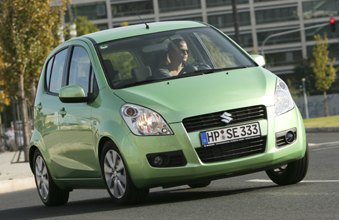
|
Designed specially for Europe, Splash
looks more stylish and drives better than its Japanese-rooted siblings.
|
The
new Suzuki Splash is a
lovely small car, isn't it ? It has all the ingredients that small car
buyers want - a cute styling, a spacious interior, modern mechanicals
and Japanese reliability. In other words, it is a strong rival to Fiat
Panda. European customers will love it, because unlike its predecessor,
Wagon R+, it is designed specially for the European market rather than
converting from an existing Japanese model. Back in 2003, a team of 10
Japanese designers led by Akira Kamio flew to Germany and stayed there
for 6 months to study customer taste and design trend of Western
Europe. Then they returned to Japan and designed Splash. This explain
why the car looks far more stylish than those boxy small cars Suzuki
offered in its home market.
Splash is positioned alongside Swift in the overcrowded small cars
lineup of Suzuki. They are about the same price and the same size -
Swift has 20 mm longer wheelbase but Splash is 20 mm longer overall.
The main difference is their height - the Swift measures a normal 1500
mm, while Splash is some 90 mm taller. Apparently, Suzuki wanted to
make the former a normal hatchback and the latter a mini-MPV, something
like Renault did to Clio and Modus. Unsurprisingly, both cars are built
on the same platform and manufactured in the same factory at Hungary.
By the way, Splash is also badge-engineered as Opel / Vauxhall Agila to
share costs.
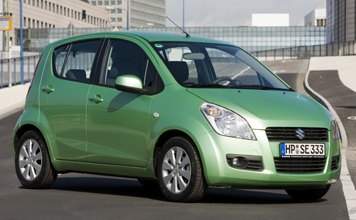 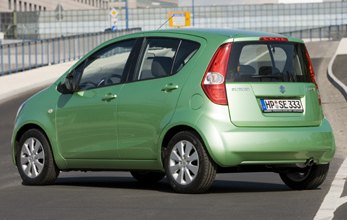
|
|
As you would expect for a Kei-car specialist, Suzuki made excellent use
of every inch of exterior dimensions to realize a spacious interior.
This cabin looks bigger than that of the Swift, thanks to its higher
roof. Passengers enjoy an extra headroom ranging from 24-31 mm yet
their hip point (the height of seating position) is 50 mm higher than
in Swift. As a result, it is more comfortable to sit and offers
excellent visibility. Its rear seats provide more legroom than Panda
and easily disgraces Toyota Aygo. There are also plenty of storage
cubbies in the cabin. The cabin design is stylish and colorful, good
enough to compensate for the hard plastics it employs.
Predictably, the tall Splash is not as driver-oriented as Swift, but
thanks to a firm suspension setting, it doesn't roll as much as you
would expect in corners. On the downside, the ride is harsher and
noisier on bumpy surfaces, lacking the refinement of Fiat Panda. Suzuki
spent some time to test and tune its suspensions on German and Spanish
roads, so its handling is much better than the previous Wagon R+. While
it is not especially interesting to drive, it is easy and safe to
handle.
Performance is perhaps the biggest weakness of Splash. Because keen
drivers are supposed to be taken care by Swift, Suzuki decided that
Splash should be powered by smaller engines to emphasize fuel economy.
This mean the most powerful engine is a 1.2-liter 16V, which produces
86 horsepower only. The entry level engine is a 997 cc 3-cylinder with
65 horsepower. Both Japanese motors are sweet-revving, but they just
lack the necessary capacity, hence torque, to ease overtaking.
Fortunately, it also offers a Fiat 1.3-liter common-rail turbo diesel
built under license. This 75 hp / 140 lb-ft unit is easily the gustiest
engine of the car.
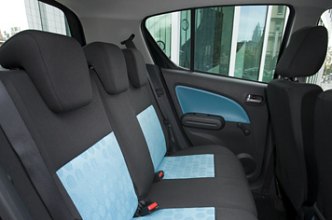 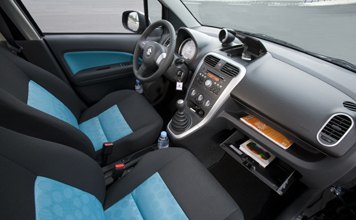
|
|
The Splash didn't set any new standards for quality, refinement or
driving dynamics. That's why it won't be considered as a new class
leader like Fiat Panda did a few years ago. However, its spacious
interior and stylish look are what the Fiat can't match. It is also as
cheap to purchase and run as the Italian car. All these factors make it
a serious contender in the A-segment.
|